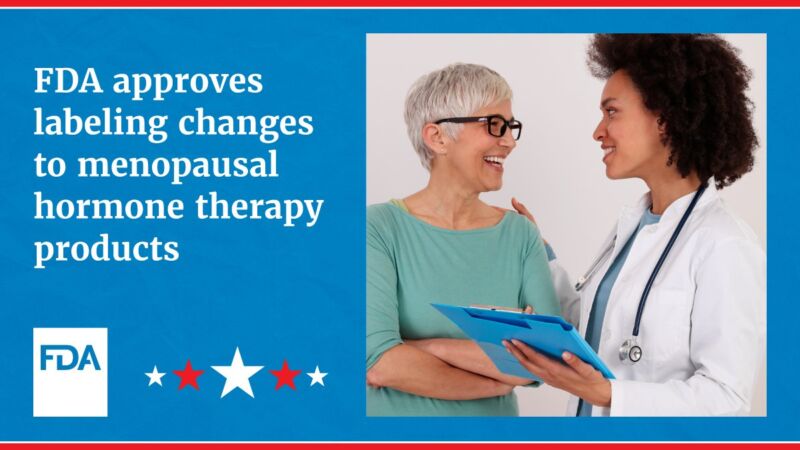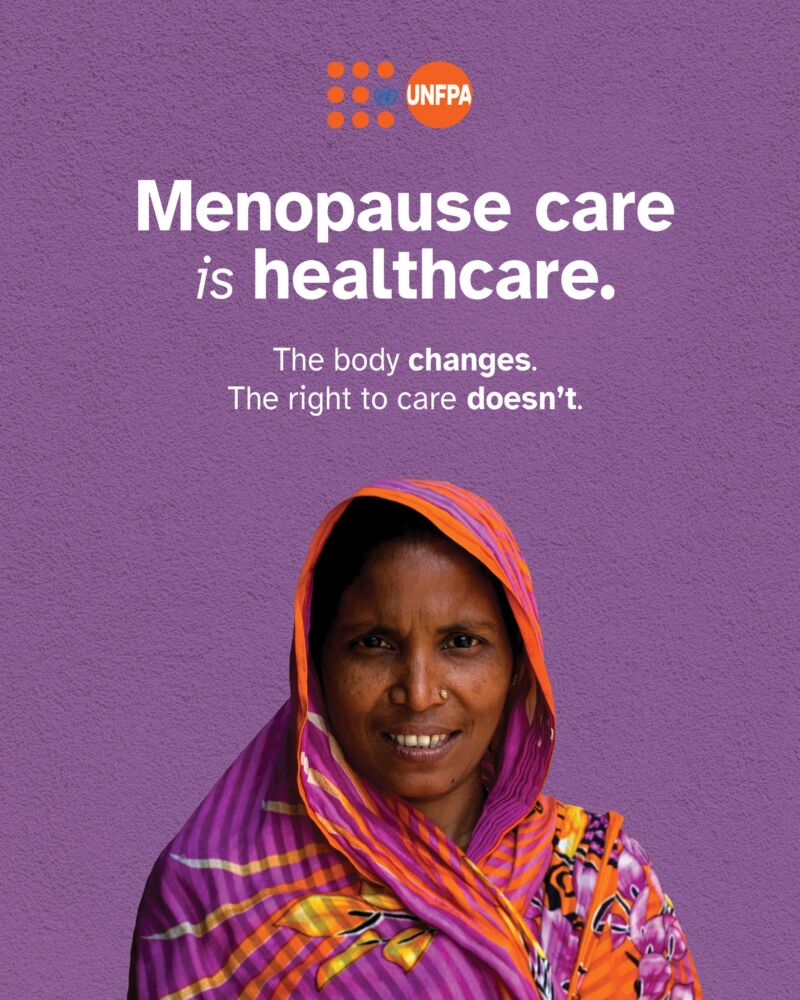“Alternative therapies, including cognitive behavioural
therapy, may also improve hot flushes, nights sweats
and other menopausal symptoms and…”.1
Umbrella
What may the Hormone Therapy Alternatives Umbrella include?
Depending on the Source (DotS) this Umbrella may include:
- Antidepressants
- Bioidentical Hormone Therapy
- Clonidine
- Complementary Medicine (CM)
- Complementary and Alternative Medicine (CAM)
- Complementary and Integrative Health (CIH)
- Gabapentin (Neurontin)
- Herbal Medicines
- Holistic Care
- Hormone Replacement Therapy (HRT)
- Hormone Therapy (HT)
- Hormone Therapy Alternatives
- Menopausal Hormone Therapy (MHT)
- Menopause Lifestyle Changes/Management
- Natural Approaches/Medicines/Practices/Products/Remedies/Supplements/Therapies/Treatments
- Nonhormonal/Non-Hormonal Approaches/Medicines/Practices/Products/Remedies/Supplements/Therapies/Treatments
- Over the Counter Products
- Phytoestrogens
- Pregabalin
- Tibolone or Livial
Effective or Not
What does The 2023 Practitioner’s Toolkit for Managing Menopause explain about the evidence to prove how effective non-hormonal options are?
In The 2023 Practitioner’s Toolkit for Managing Menopause: Management – Non-Hormonal Options With Evidence To Support Efficacy, published online 30 October 2023, the authors explain:
What are VMS?
VMS can be an abbreviation for Vasomotor Symptoms which include hot flushes and night sweats.
Effective
What non-hormonal therapies have evidence to prove they are effective?
In The 2023 Practitioner’s Toolkit for Managing Menopause: Management – Non-Hormonal Options With Evidence To Support Efficacy, the authors also note:
The selective serotonin reuptake inhibitors and serotonin-norepinephrine reuptake inhibitors are effective in some, but not all, women with VMS…
Fezolinetant is a neurokinin 3B receptor antagonist that acts centrally in the brain to reduce VMS. It may improve sleep quality by reducing nocturnal VMS. Fezolinetant has been approved for the treatment of VMS at a dose of 45 mg/day in some countries.
Low-dose oxybutynin has been found to be effective for treatment of VMS either as a standard low-dose or extended-release formulation.
Other potential, but probably less effective, options include clonidine and gabapentin/pregabalin. Clonidine may be prescribed for VMS for women who cannot take estrogen at a dose of 100–150 μg/day, although the effect is modest and it is not consistently recommended…
Hypnosis may diminish VMS frequency and severity in postmenopausal women and can be considered a treatment option for women who are unable to take MHT.
Cognitive behavior therapy employs psychotherapeutic behavior modification to help women deal with VMS. Cognitive behavior therapy has been shown to significantly reduce VMS.
Stellate ganglion blockade at the anterolateral aspect of the C6 vertebra on the right side under fluoroscopy can alleviate severe VMS for up to 12 weeks. This procedure requires a highly skilled practitioner and availability is scant”.3
On pages one and two in Nonhormone Treatments for Hot Flashes and Night Sweats, published July 2023, the North American Menopause Society (NAMS) (now the (United States) Menopause Society)) explain:
 “Nonhormone Treatment Options
“Nonhormone Treatment Options
Recommended
The treatments with research showing they are effective for treating VMS include:
- Clinical Hypnosis…
- Cognitive-Behavioral Therapy…
- Fezolinetant
- Gabapentin
- Oxybutynin
- SSRIs/SNRIs
- Stellate Ganglion Block
- Weight Loss
Not Recommended
Treatments not recommended for VMS either because there is evidence showing that they do not reduce VMS or because there is not enough evidence showing that they are effective in reducing VMS include acupuncture, paced respirations, supplements/herbal remedies, cooling techniques, avoidance of triggers, dietary modification, exercise, yoga, mindfulness-based intervention, relaxation, suvorexant, cannabinoids, calibration of neural oscillations, chiropractic interventions, clonidine, and pregabalin”.4
Elinzanetant (Lynkuet)
What is Elinzanetant?
In Lynkuet® (Elinzanetant) for the Treatment of Vasomotor Symptoms Due To Menopause: Interview Transcript [+ Video], published 03 November 2025, JoAnn Pinkerton MD, discusses Lynkuet® (Elinzanetant):
Where may I find Links to Elinzanetant?
Your Country may have Links similar to:
- Bayer’s Lynkuet® (elinzanetant), the First and Only Neurokinin 1 and Neurokinin 3 Receptor Antagonist, Receives FDA Approval for Moderate To Severe Hot Flashes Due To Menopause [24 October 2025]
- Efficacy and Safety of Elinzanetant In Vasomotor Symptoms In Menopause [21 November 2025]
- FDA Approves Elinzanetant (Lynkuet) for Vasomotor Menopausal Symptoms [24 October 2025]
- JoAnn Pinkerton, MD, Highlights Long-Term Safety and Efficacy of Elinzanetant [+ Video] [28 September 2025]
- Lynkuet® (Elinzanetant) for the Treatment of Vasomotor Symptoms Due To Menopause [+ Video] [03 November 2025]
Cognitive Behavioral Therapy
Is Cognitive Behavioural Therapy (CBT) effective in managing hot flushes?
In Harness the Power of Your Mind To Beat Hot Flushes: It’s the Symptom That Plagues So Many Menopausal Women — and Now Here’s A Drug-Free Way That’s Proven To Tackle It the authors elaborate on:
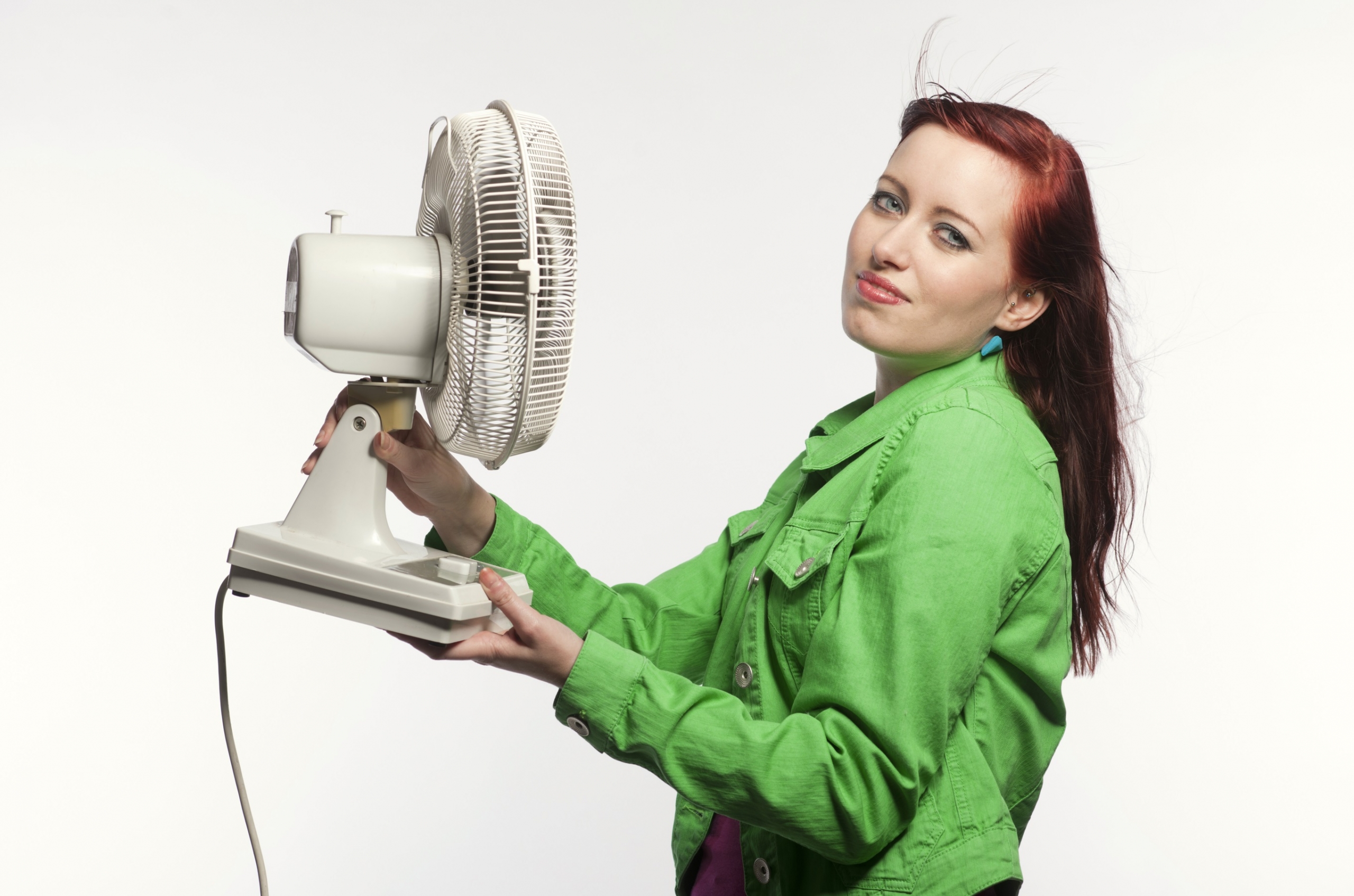 “…CBT, by changing behaviours and thought patterns surrounding hot flushes, can dramatically reduce their frequency, duration and intensity. It can also help ease menopausal symptoms such as low mood and poor sleep. It effectively targets the vicious cycle so symptoms become more manageable and mood improves”.6
“…CBT, by changing behaviours and thought patterns surrounding hot flushes, can dramatically reduce their frequency, duration and intensity. It can also help ease menopausal symptoms such as low mood and poor sleep. It effectively targets the vicious cycle so symptoms become more manageable and mood improves”.6Dietary Supplements
Can dietary supplements improve menopause symptoms?
On page two in Nonhormone Treatments for Hot Flashes and Night Sweats the NAMS explain:
Despite the lack of evidence supporting their use for VMS, if you plan to use dietary supplements, let your health care professional know so they can ensure they are safe for you, that they don’t interact with any of your medications, and so that they can be appropriately monitored”.7
Antidepressants
Can some antidepressants reduce menopause symptoms?
In Treatments for Menopause: Non-Hormonal Prescription Medications – Antidepressants the (Australian) Jean Hailes for Women’s Health note:
Note that paroxetine and fluoxetine can reduce the effectiveness of some cancer treatment medicines”.8
In Hot Flashes: Diagnosis & Treatment – Treatment: Antidepressants, dated 04 March 2025, the (United States) Mayo Clinic elaborate on:
Other antidepressants that have been used to treat hot flashes include:
- Venlafaxine (Effexor XR)
- Paroxetine (Paxil)
- Citalopram (Celexa)
- Escitalopram (Lexapro)
Antidepressants don’t work as well as hormone therapy for strong hot flashes. But they can help people who can’t use hormones. Possible side effects include nausea, trouble sleeping or feeling sleepy, weight gain, dry mouth or trouble having sex”.9
Other Medications
Apart from antidepressants, can some other medications improve menopause symptoms?
In Hot Flashes: Diagnosis & Treatment – Treatment: Other Prescription Medicines the Mayo Clinic also explain:
- Gabapentin (Neurontin, Gralise, Others). This antiseizure medicine helps ease hot flashes. Side effects can include being drowsy, dizzy or tired and swelling in the arms and legs, called edema
- Pregabalin (Lyrica). This is another anti-seizure medicine that can help ease hot flashes. Side effects can include being drowsy and dizzy, having trouble focusing, and gaining weight
- Oxybutynin (Oxytrol). This is a pill or patch most often used to treat urinary conditions like overactive bladder. It also may help ease hot flashes in some people. Side effects can include dry mouth, dry eyes, having nausea, and being constipated and dizzy
- Clonidine (Catapres-TTS 1, Nexiclon Xr, Others). This pill or patch mostly used to treat high blood pressure, might give some relief from hot flashes. Side effects include being dizzy, drowsy and constipated and having a dry mouth
- Fezolinetant (Veozah). This daily pill treats menopause hot flashes without hormones. It works by blocking a pathway in the brain that helps to manage body temperature”.10
Bioidentical Hormone Therapy
Can bioidentical hormone therapy improve menopause symptoms?
On page four in the Joint Position Statement By the British Menopause Society, Royal College of Obstetricians and Gynaecologists and Society for Endocrinology on Best Practice Recommendations for the Care of Women Experiencing the Menopause, first published online 10 June 2022, one of the recommendations is:
- “The use of compounded bioidentical hormone replacement therapies is not recommended given the issues related to their purity, potency and safety. The potential benefits of bioidentical hormone therapy can be achieved using conventionally licensed products available through NHS prescribing without having to resort to compounded varieties from specialist pharmacies”.11
Nerve Block Procedure
Can a nerve block procedure be used to treat moderate to severe hot flushes?
In Hot Flashes: Diagnosis & Treatment – Treatment: Nerve Block Procedure the Mayo Clinic note:
Lifestyle Medicine In Menopause Care
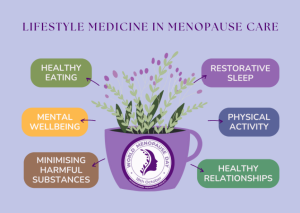 What can lifestyle medicine in menopause care encompass?
What can lifestyle medicine in menopause care encompass?
In The Role of Lifestyle Medicine In Menopausal Health: A Review of Non-Pharmacologic Interventions – Abstract: Objective the authors encompass:
Menopause Symptoms
In The Role of Lifestyle Medicine In Menopausal Health: A Review of Non-Pharmacologic Interventions, what did the results include about some menopause symptoms?
In The Role of Lifestyle Medicine In Menopausal Health: A Review of Non-Pharmacologic Interventions the results include:
Questions To Ask
What may be questions to ask about HT alternatives?
In Menopause Treatment: Questions for Your Healthcare Provider the (United States) Endocrine Society include:
- “What do you think are possible triggers for my hot flashes?
- Are there any lifestyle or dietary interventions that may diminish my symptoms?
- Should I consider medication for treatment of my symptoms? Hormonal or non-hormonal?
- If you are interested in hormonal therapy: Am I a good candidate for hormonal therapy, specifically are my cardiovascular and breast cancer risks low?
- Which lifestyle changes can I make that will decrease my menopause symptoms without medicine?
- Are there any alternative medicine treatments you would recommend I try for relief of my menopause symptoms?
- Are there any alternative medicines I should not use because they could interfere with medicines I take?”15
Health Care Provider
What if I would like to find out about HT alternatives?
If you would like to find out about HT alternatives, it may be in your best interest to choose to talk to your health care provider about this. Together you can discuss your options and if required, agree on who may be the most appropriate health care provider to help you.
On page one in Complementary & Alternative Therapies: Non Hormonal Treatments for Menopause Symptoms, dated November 2025, the (British) Women’s Health Concern caution:
Health Topics A-Z
Where may I find Health Topics A-Z related to Hormone Therapy Alternatives?
In Health Topics A-Z you may find:
Links
Where may I find Links related to Hormone Therapy Alternatives?
Your Country may have Links similar to:
Links
This Links List to third party websites is neither comprehensive nor exhaustive. Inclusion on this Links List does not imply endorsement or recommendation. Non-inclusion on this Links List does not imply non-endorsement or non-recommendation. Third party websites are not under the control of Meno Martha International Menopause Directory. Third party websites may contain explicit medical images and/or sexual references. Please read Meno Martha International Menopause Directory’s Links Policy before proceeding to a Link. Please contact Webmaster if you experience a problem with a Link.New or Updated
- Bayer’s Lynkuet® (Elinzanetant), the First and Only Neurokinin 1 and Neurokinin 3 Receptor Antagonist, Receives FDA Approval for Moderate To Severe Hot Flashes Due To Menopause [24 October 2025]
- Complementary & Alternative Therapies: Non-Hormonal Treatments for Menopause Symptoms [November 2025]
- Evolving Approaches To Vasomotor Symptoms In Menopause: Novel Pathways and Emerging Therapies [31 October – 16 December 2025]
- Genevieve Neal-Perry, MD, PhD, Discusses New Nonhormonal Treatments for Hot Flashes [12 December 2025]
- Nonhormonal Therapies Transform Menopause Care In 2025 [+ Video] [21 December 2025]
- Webinars: Lifestyle Medicine [14 October 2025]
- ACOG Explains: Managing Menopause Symptoms [American College of Obstetricians and Gynecologists]
- Bayer’s Lynkuet® (elinzanetant), the First and Only Neurokinin 1 and Neurokinin 3 Receptor Antagonist, Receives FDA Approval for Moderate To Severe Hot Flashes Due To Menopause
- Bioidentical Hormones: Are They Safer?
- CBT for Menopausal Symptoms
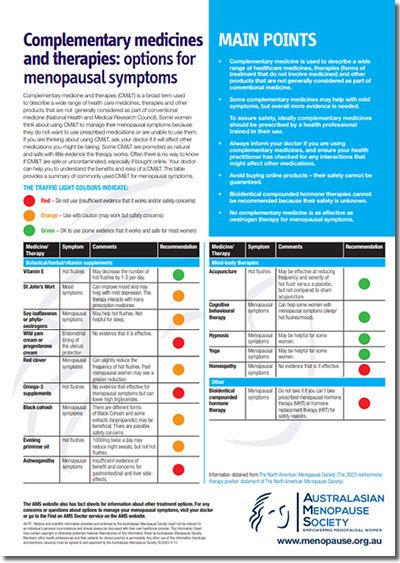 Can Hot Flashes Be Managed Through Diet?
Can Hot Flashes Be Managed Through Diet?- Cognitive Behaviour Therapy (CBT) for Menopausal Symptoms
- Complementary & Alternative Therapies: Non-Hormonal Treatments for Menopause Symptoms
- Complementary Medicines and Therapies for Hot Flushes
- Complementary Medicines and Therapies: Options for Menopausal Symptoms
- Consumer Video and Podcast Series: 2023 Consumer Videos and Podcasts – NAMS 2023 Nonhormone Therapies Position Statement for Bothersome Menopause Symptoms
- Consumer Video and Podcast Series: 2023 Consumer Videos and Podcasts – New FDA-Approved Nonhormone Option for the Treatment of Hot Flashes
- Consumer Video and Podcast Series: 2024 Consumer Videos and Podcasts – Cognitive Behavioral Therapy and Menopause
- Consumer Video and Podcast Series: 2025 Consumer Videos and Podcasts – Nutrition At Menopause and Why It Is Important
- Deciding About Hormone Therapy Use
- Dietary Intake and Menopausal Symptoms In Postmenopausal Women: A Systematic Review
- Efficacy and Safety of Elinzanetant In Vasomotor Symptoms In Menopause [21 November 2025]
- Efficacy and Safety of Fezolinetant and Elinzanetant for Vasomotor Symptoms In Postmenopausal Women: A Systematic Review and Meta-Analysis
- Elinzanetant Long-Term Safety Data With JoAnn Pinkerton, MD, FACOG, NCMp [Video]
- Elinzanetant Reduces Vasomotor Symptom Frequency and Intensity In New Meta-Analysis
- Elinzanetant for the Treatment of Vasomotor Symptoms Associated With Menopause. A Phase 3 Randomized Clinical Trial
- Elinzanetant for the Treatment of Vasomotor Symptoms Associated With Menopause: OASIS 1 and 2 Randomized Clinical Trials
- Evolving Approaches To Vasomotor Symptoms In Menopause: Novel Pathways and Emerging Therapies [31 October – 16 December 2025]
- FDA Adds Warning About Rare Occurrence of Serious Liver Injury With Use of Veozah (Fezolinetant) for Hot Flashes Due To Menopause
- FDA Approves Elinzanetant (Lynkuet) for Vasomotor Menopausal Symptoms
- Fezolinetant (Veoza): Risk of Liver Injury – New Recommendations To Minimise Risk
- Fezolinetant for Hot Flashes Did Not Increase Body Weight or BMI
- Find A Menopause Practitioner [United States and Other]
- Find A Practitioner [Australasian Menopause Society i.e. Australia and New Zealand]
- Find Your Nearest BMS Menopause Specialist [British Menopause Society]
- For Some Women, Hormone Therapy Isn’t An Option. Are Menopause Supplements Any Better?
- Gabapentin for Hot Flashes: What To Know
- Genevieve Neal-Perry, MD, PhD, Discusses New Nonhormonal Treatments for Hot Flashes
- Genitourinary Syndrome of Menopause
- Genitourinary Syndrome of Menopause
- Harvard Health Ad Watch: New Drug, Old Song, Clever Tagline. How Well Does A New Drug Prevent Hot Flashes?
- Hot Flashes: Are There Any Lifestyle Changes I Can Make To Help With Hot Flashes?
- Hot Flashes: Are There Foods That Can Help With My Hot Flashes?
- Hot Flashes: Non-Hormonal Medications
- Hot Flashes: Over-the-Counter Therapies
- Hot Flashes: What Can I Do? [+ Video: What Are the Signs and Symptoms of Menopause?]
- Hot Flushes, Night Sweats, Brain Fog? Here’s What We Know About Phytoestrogens for Menopausal Symptoms
- How Fezolinetant Advances Non-Hormonal Treatment of Hot Flashes [+ Video]
- How Fezolinetant Revolutionizes Non-Hormonal Menopause Therapy [Video]
- IMS Interview Series for Women: Lifestyle Medicine With Prof. Rossella Nappi | For Women
- International Menopause Society (IMS) Recommendations and Key Messages on Women’s Midlife Health and Menopause
- JoAnn Pinkerton, MD, Highlights Long-Term Safety and Efficacy of Elinzanetant
- Joint Position Statement By the British Menopause Society, Royal College of Obstetricians and Gynaecologists and Society for Endocrinology on Best Practice Recommendations for the Care of Women Experiencing the Menopause
- Later Years (Around 50 Years and Over): Menopause and Post Menopause Health – Treating Menopause Symptoms [+ Video: Does the Menopause Happen Suddenly] [Other Languages and Formats]
- Lots of Women Try Herbs Like Black Cohosh for Menopausal Symptoms Like Hot Flushes – But Does It Work?
- Lubricant Alternatives: What To Use and What To Avoid
- Lynkuet® (Elinzanetant) for the Treatment of Vasomotor Symptoms Due To Menopause [+ Video]
- MHRA Approves Elinzanetant To Treat Moderate To Severe Vasomotor Symptoms (Hot Flushes) Caused By Menopause
- Menopause
- Menopause
- Menopause
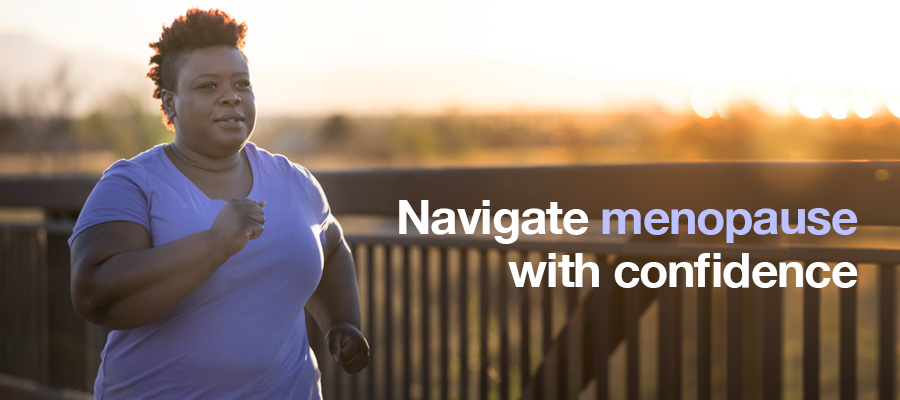
- Menopause Map: Downloadable Resources – My Personal Path Print Tools: Questions for Your Health Care Provider

- Menopause Symptoms: Mayo Clinic Expert Outlines Hormone and Nonhormonal Therapies
 Menopause Treatments: What Works, What Doesn’t – Cognitive Behavioural Therapy (CBT) and Mindfulness
Menopause Treatments: What Works, What Doesn’t – Cognitive Behavioural Therapy (CBT) and Mindfulness- Menopause Treatments: What Works, What Doesn’t – Natural Therapies
- Menopause Treatments: What Works, What Doesn’t – Non-Hormonal Prescription Medications
- Menopause-Associated Vasomotor Symptom Treatment With Elinzentant [Podcast]
- Menopause: Identification and Management [NICE Guideline Published: 12 November 2015 Last Updated: 07 November 2024]
- National Institute for Health and Care Excellence: Final – Menopause [A] Cognitive Behavioural Therapy [Nice Guideline NG23]
- Nanette Santoro, MD: Vasomotor Symptoms, Treatment, and Potential of Elinzanetant [Video]
- National Center for Complementary and Integrative Health: 4 Tips: Start Talking With Your Health Care Providers About Complementary Health Approaches
- National Center for Complementary and Integrative Health: Black Cohosh
- National Center for Complementary and Integrative Health: Dietary and Herbal Supplements
- National Center for Complementary and Integrative Health: Herbs At A Glance
- National Center for Complementary and Integrative Health: How Safe Is This Product or Practice?
- National Center for Complementary and Integrative Health: Meditation and Mindfulness: What You Need To Know
- National Center for Complementary and Integrative Health: Natural Doesn’t Necessarily Mean Safer, or Better
- National Center for Complementary and Integrative Health: Red Clover
- Natural Therapies
- Navigating Menopause Care Resource Guide
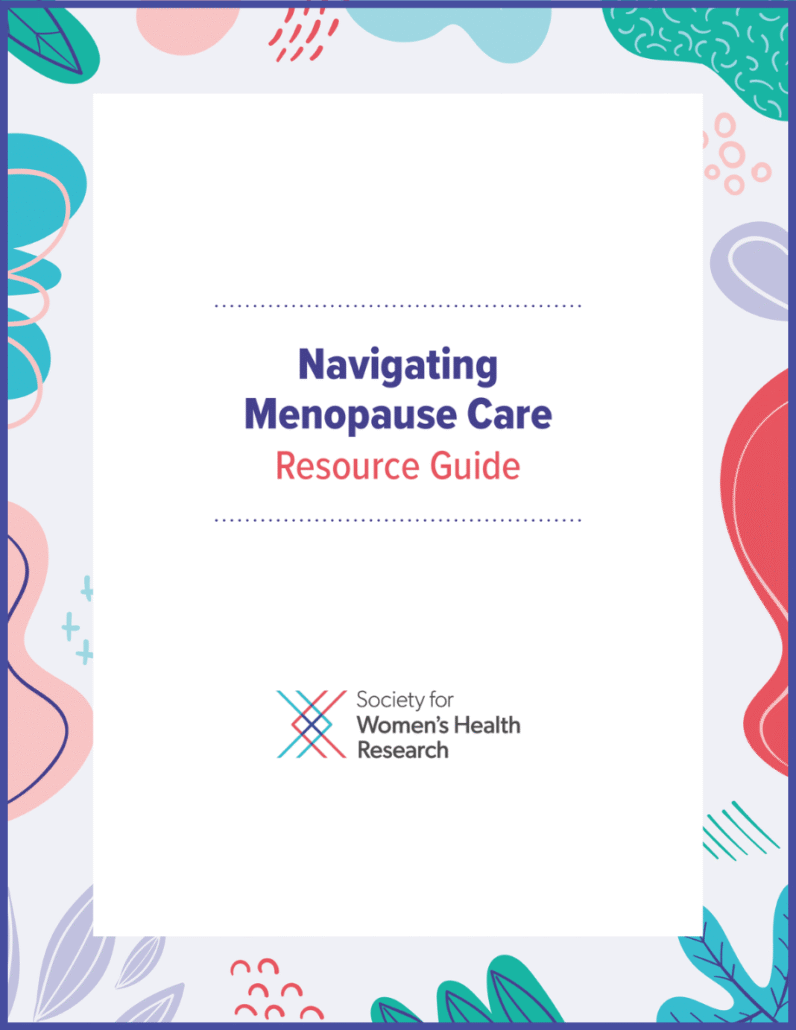
- Non-Hormonal Drug Approved To Treat Menopausal Symptoms [Veozah, Canada]
- Non-Hormonal Management of Vasomotor Symptoms of Menopause
- Non-Hormonal Treatments Offer Relief for Genitourinary Syndrome of Menopause [+ Video]
- Non-Hormonal Treatments for Menopausal Symptoms
- Nonhormonal Therapies Transform Menopause Care In 2025 [+ Video]
- Nonhormone Treatments for Hot Flashes and Night Sweats
- Office of Dietary Supplements: Dietary Supplement Fact Sheets
- Resources: Fact Sheets [Multiply Languages]

- Resources: Infographics

- Resources: Posters

- Revolutionizing Menopause Management: A Deep Dive Into Fezolinetant [+ Video]
- Rossella Nappi, MD, Discusses Benefits of Fezolinetant Against Vasomotor Symptoms [Video]
- Special Report: Recent Advancements In Pharmacologic and Nonpharmacologic Treatment Options [+ Video]
- Supplements: What Works, What Doesn’t and the Truth About Menowashing
- Systematic Review and Network Meta-Analysis Comparing the Efficacy of Fezolinetant With Hormone and Nonhormone Therapies for Treatment of Vasomotor Symptoms Due To Menopause
- The 2023 Nonhormone Therapy Position Statement of The North American Menopause Society
- The Role of Lifestyle Medicine In Menopausal Health: A Review of Non-Pharmacologic Interventions
- Therapy Could Be Effective Treatment for Non-Physical Symptoms of Menopause
- Tips To Help Manage Menopause Symptoms
- Treatments for Menopause: Non-Hormone Treatments
- Updated 2024 NICE Menopause Guidance Summary
- Webinars: Lifestyle Medicine
- Webinars: Non-Hormonal Pharmacological Interventions For VMS
- Webinars: Non-Pharmacological Interventions For VMS
- World Menopause Day 2025 [18 October]
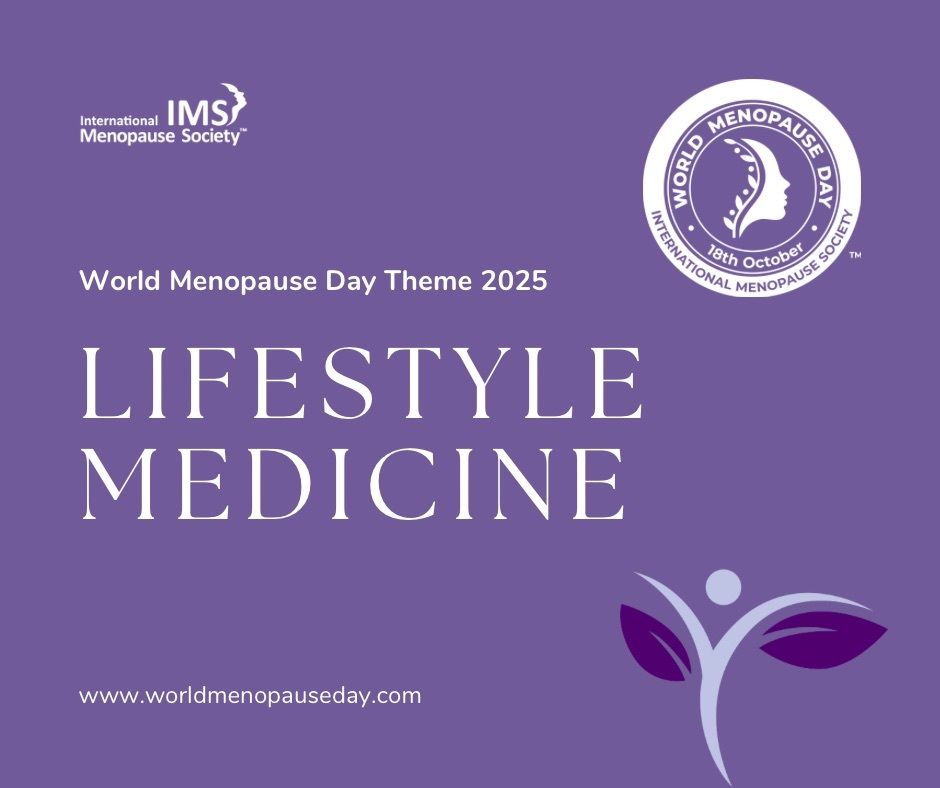
- World Menopause Day 2025: The IMS White Paper: The Role of Lifestyle Medicine In Menopausal Health: A Review of Non-Pharmacologic Interventions [Multiply Languages]
Sources
Where may I find the Sources quoted?
You may find the Sources quoted at:
Sources
- Hamoda, H., Mukherjee, A., Morris, E., Baldeweg, S. E., Jayasena, C. N., Briggs, P., Moger, S. Joint Position Statement By the British Menopause Society, Royal College of Obstetricians and Gynaecologists and Society for Endocrinology on Best Practice Recommendations for the Care of Women Experiencing the Menopause. First Published Online 10 June 2022:1-2. https://journals.sagepub.com/doi/full/10.1177/20533691221104879 Accessed: 01 February 2026
- Davis, S. R., Taylor, S., Hemachandra, C., Magraith, K., Ebeling, P. R., Jane, F., and Islam, R. M. The 2023 Practitioner’s Toolkit for Managing Menopause: Management – Non-Hormonal Options With Evidence To Support Efficacy. First Published Online: 30 October 2023 https://www.tandfonline.com/doi/full/10.1080/13697137.2023.2258783 Accessed: 01 February 2026
- Davis, S. R., Taylor, S., Hemachandra, C., Magraith, K., Ebeling, P. R., Jane, F., and Islam, R. M. The 2023 Practitioner’s Toolkit for Managing Menopause: Management – Non-Hormonal Options With Evidence To Support Efficacy. First Published Online: 30 October 2023 https://www.tandfonline.com/doi/full/10.1080/13697137.2023.2258783 Accessed: 01 February 2026
- Nonhormone Treatments for Hot Flashes and Night Sweats. July 2023:1-2. North American Menopause Society https://menopause.org/wp-content/uploads/default-document-library/nonhormone-treatment-menonote_f5afc19f-211e-4c1f-8a04-b2d558c6fa66.pdf Accessed: 01 February 2026
- Duffy, S. Lynkuet® (Elinzanetant) for the Treatment of Vasomotor Symptoms Due To Menopause: Interview Transcript. 03 November 2025 https://www.empr.com/news/lynkuet-elinzanetant-for-the-treatment-of-vasomotor-symptoms-due-to-menopause/ Accessed: 01 February 2026
- Hunter, M. and Smith, M. Harness the Power of Your Mind To Beat Hot Flushes: It’s the Symptom That Plagues So Many Menopausal Women — and Now Here’s A Drug-Free Way That’s Proven To Tackle It. 26 January 2021 https://www.dailymail.co.uk/health/article-9185969/Harness-power-mind-beat-hot-flushes.html Accessed: 01 February 2026
- Nonhormone Treatments for Hot Flashes and Night Sweats. July 2023:2. North American Menopause Society https://menopause.org/wp-content/uploads/default-document-library/nonhormone-treatment-menonote_f5afc19f-211e-4c1f-8a04-b2d558c6fa66.pdf Accessed: 01 February 2026
- Treatments for Menopause: Non Hormonal Prescription Medications: Antidepressants. Last Updated: 13 May 2025 | Last Reviewed: 22 April 2025. Jean Hailes for Women’s Health https://jeanhailes.org.au/health-a-z/menopause/menopause-management Accessed: 01 February 2026
- Hot Flashes: Diagnosis & Treatment – Treatment: Antidepressants. 04 March 2025. Mayo Clinic https://www.mayoclinic.org/diseases-conditions/hot-flashes/diagnosis-treatment/drc-20352795 Accessed: 01 February 2026
- Hot Flashes: Diagnosis & Treatment – Treatment: Other Prescription Medicines. 04 March 2025. Mayo Clinic https://www.mayoclinic.org/diseases-conditions/hot-flashes/diagnosis-treatment/drc-20352795 Accessed: 01 February 2026
- Hamoda, H., Mukherjee, A., Morris, E., Baldeweg, S. E., Jayasena, C. N., Briggs, P., Moger, S. Joint Position Statement By the British Menopause Society, Royal College of Obstetricians and Gynaecologists and Society for Endocrinology on Best Practice Recommendations for the Care of Women Experiencing the Menopause. First Published Online 10 June 2022:4. https://journals.sagepub.com/doi/full/10.1177/20533691221104879 Accessed: 01 February 2026
- Hot Flashes: Diagnosis & Treatment – Treatment: Nerve Block Procedures. 04 March 2025. Mayo Clinic https://www.mayoclinic.org/diseases-conditions/hot-flashes/diagnosis-treatment/drc-20352795 Accessed: 01 February 2026
- Anewke CV, Cano A, Mulligan J, et al. 2025:1. The Role of Lifestyle Medicine In Menopausal Health: A Review of Non-Pharmacologic Interventions – Abstract: Objective. 2025:1. https://www.tandfonline.com/doi/full/10.1080/13697137.2025.2548806 Accessed: 01 February 2026
- Anewke CV, Cano A, Mulligan J, et al. 2025:1. The Role of Lifestyle Medicine In Menopausal Health: A Review of Non-Pharmacologic Interventions. 2025:1. https://www.tandfonline.com/doi/full/10.1080/13697137.2025.2548806 Accessed: 01 February 2026
- Menopause Treatment: Questions for Your Healthcare Provider. 24 January 2022. Endocrine Society https://www.endocrine.org/patient-engagement/endocrine-library/menopause-treatment Accessed: 01 February 2026
- Complementary & Alternative Therapies: Non Hormonal Treatments for Menopause Symptoms. Review Date: November 2025. Women’s Health Concern https://www.womens-health-concern.org/wp-content/uploads/2025/11/03-NEW-WHC-FACTSHEET-Complementary-And-Alternative-Therapies-NOV2025-B.pdf Accessed: 01 February 2026






